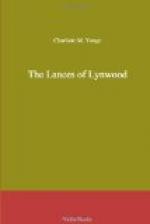“I believe you fully, Arthur,” replied his uncle; “the more, that I should have been the last person to whom you would have brought information gained in such a fashion.”
“And how was it gained?” asked Sir John.
“That,” said the boy, “is a secret I am bound never to disclose.”
“Strange, passing strange,” repeated the old Knight, shaking his head. “Clarenham and Ashton would scarce have taken any into their councils who would warn you. And you will or can tell no more?”
“No more,” replied the boy. “I was bidden secretly to warn my uncle of the entrance to the vaults, and of the treachery of this villain garrison. I did so, and he who says aught dishonourable of him or of me lies in his throat.”
“Can you read this riddle, Sir Eustace?” asked Chandos, looking rather suspiciously at the very faint glow which mantled in the white cheek of the wounded Knight.
“I know nothing but what he has told you, Sir John,” replied he.
“Nor guess aught?” said Sir John; “but perhaps that is scarce a fair query; and I will to the rest of my business, though it is scarce needed—only I would have the Prince see the full extent of the falsehoods with which he has been gulled.” And he then proceeded to inquire into the circumstances of Lady Eleanor’s funeral, the brawling, the violent abstraction of Arthur, and of a considerable portion of his property, and the long delay, which had given his enemies so much opportunity to blacken his character. Eustace explained all fully to the satisfaction of Chandos, and appealed to numerous witnesses.
“That is well,” said the old Knight. “We shall have it all clear as daylight;—and the only wonder is, that the Prince could be so long deceived by such monstrous falsehoods. Let me see—your right to the wardship is established?”
“Yes; it hath been so decided by the Bishop of Winchester.”
“And let me tell you, Sir Eustace, you did yourself little good by getting the interest of the Duke of Lancaster. Methought it still further prejudiced the Prince.”
“It was justice that I sought, not favour,” said Eustace.
“The knightly view,” said Sir John; “and it was more the work of your friends than yourself; but I never loved that young John of Lancaster, and still less since he hath seemed willing to make a party for himself. I trow he hath given the Prince a distrust of all uncles. Ha! little varlet!” added he, as he met Arthur’s eyes— “if you can keep one secret, keep another, or, still better, forget what I have said. Understandest thou?”
“I will answer for him,” said Eustace.
“And now,” said Chandos, “I must be on my way back; for that expedition to Bescancon must be looked to. But what is to be done with the boy?”
“Oh, I remain here,” cried Arthur, eagerly. “The Prince consented. Oh, I pray of you let me stay here.”
“In this dismal old Castle, Arthur,” said Eustace, “apart from all your playmates? It will not be like home, remember; for scarce ever will you be able to go beyond the walls—and with me lying here, and Gaston always occupied, you will find it weary work.”




